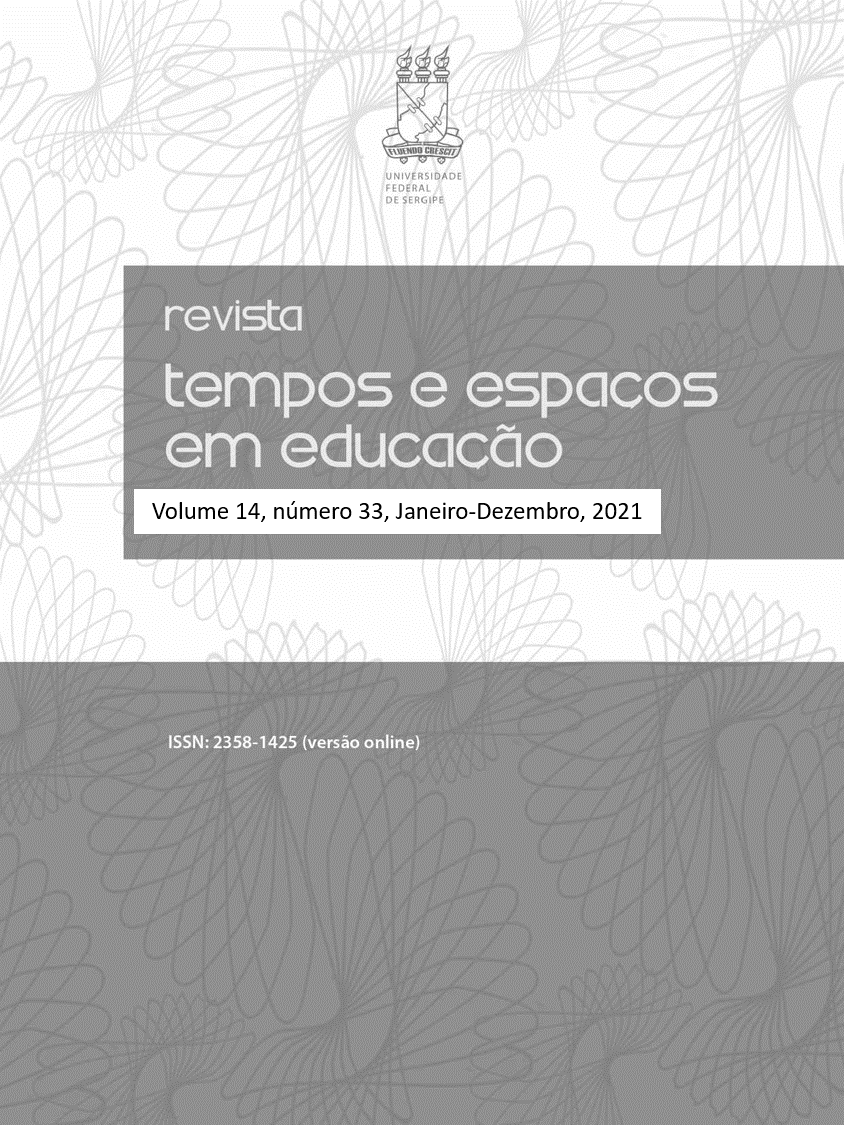Alfabetização digital dos professores da Covid-19
DOI:
https://doi.org/10.20952/revtee.v14i33.16853Palavras-chave:
TIC, Internet, Educação, Digitalização, Aprendizagem OnlineResumo
O artigo é dedicado ao estudo da competência digital dos professores do ramo de Surgut da Tyumen Industrial University, bem como a sua opinião sobre a viabilidade da introdução das TIC na estrutura da educação dos alunos. Com base no inquérito, foram identificadas as formas de utilização das TIC pelos professores, destacaram-se as principais características das TIC utilizadas no processo de ensino das diferentes disciplinas, o nível de digitalização do processo educativo. A pesquisa foi realizada com base na Universidade Industrial de Tyumen. O procedimento de coleta de dados incluiu um questionário contendo 13 questões, sendo 11 fechadas, com sugestões de opções, e 2 abertas. A partir dos dados obtidos, foram identificadas as dificuldades encontradas pelos professores, que impedem a introdução de tecnologias modernas no processo de aprendizagem. O artigo apresenta a ideia de mudar a abordagem da formação de professores para o processo de implementação das TIC. Conclui-se que os dados obtidos permitem reformular a estratégia da atividade educativa.
Downloads
Referências
Ghavifekr, S., Kunjappan, T., Ramasamy, L., & Anthony, A. (2016). Teaching and Learning with ICT Tools: Issues and Challenges from Teachers' Perceptions. Malaysian Online Journal of Educational Technology, 4(2), 38-57. https://eric.ed.gov/?id=EJ1096028.
Ilyina, E. A., Shchiptova, A. V., Poverinov, I. E., Grigoreva, S. V., Gorshkova, N. K., & Fisunov, P. A. (2019). Features of the Development of the Digital Educational Environment in Russia. International Journal of Higher Education, 8(7), 121-131. https://doi.org/10.5430/ijhe.v8n7p121.
Kaban, A. L., & Aşçı, S. (2021). COVID-19 Chronicles in Education: Overcoming Global Pandemic Challenges in Turkey by Empowering Educators to Become Digitally Literate. In New Student Literacies amid COVID-19: International Case Studies. Emerald Publishing Limited. https://doi.org/10.1108/S2055-364120210000041016.
Krainov, G. N., Panov, A. I., & Zubkov, S. A. (2021). Challenges of digitalization for higher education in Russia. In SHS Web of Conferences (Vol. 103, p. 02011). EDP Sciences.
Kryukov, V. V., & Shakhgeldyan, K. I. (2012). Information technology at the university: strategy, trends and experience. University Management: Practice and Analysis.
Livingstone, S. (2012). Critical reflections on the benefits of ICT in education. Oxford review of education, 38(1), 9-24. https://doi.org/10.1080/03054985.2011.577938.
Mikheev, A., Serkina, Y., & Vasyaev, A. (2021). Current trends in the digital transformation of higher education institutions in Russia. Education and Information Technologies, 1-15. https://doi.org/10.1007/s10639-021-10467-6.
Miranda, G. L. (2007). The limits and possibilities of ICT in education. adventure in the search for knowledgewith Sisyphusfate of incessantly restarting the same task.”. http://hdl.handle.net/10451/2824.
Osina, D. M., Tolstopyatenko, G. P., & Malinovsky, A. A. (2020, May). Digitalization of higher legal education in russia in the age of covid-19. In International Scientific and Practical Conference (139, 392-398). Springer, Cham. DOI https://doi.org/10.1007/978-3-030-53277-2_47.
Pelgrum, W. J. (2001). Obstacles to the integration of ICT in education: results from a worldwide educational assessment. Computers & education, 37(2), 163-178. https://doi.org/10.1016/S0360-1315(01)00045-8.
Priyadarshini, A., & Bhaumik, R. (2020). E-readiness of Senior School Learners to Online Learning Transition amid COVID-19 Lockdown. Asian Journal of Distance Education, 15(1), 244-256. Retrieved from https://www.asianjde.com/ojs/index.php/AsianJDE/article/view/456.
Purnama, S., Ulfah, M., Machali, I., Wibowo, A., & Narmaditya, B. S. (2021). Does digital literacy influence students’ online risk? Evidence from Covid-19. Heliyon, 7(6), e07406. https://doi.org/10.1016/j.heliyon.2021.e07406.
Ronzhina, N., Kondyurina, I., Voronina, A., Igishev, K., & Loginova, N. (2021). Digitalization of Modern Education: Problems and Solutions. International Journal of Emerging Technologies in Learning, 16(4).
Rozhkova, D., Rozhkova, N., & Blinova, U. (2020). Digital universities in Russia: digitization with extra speed. J. Digit. Sci., 2(1), 76-81. https://doi.org/10.33847/2686-8296.2.1_7.
Sá, M. J., & Serpa, S. (2020). COVID-19 and the Promotion of Digital Competences in Education. Universal Journal of Educational Research, 8(10), 4520-4528.
Sánchez-Cruzado, C., Santiago Campión, R., & Sánchez-Compaña, M. (2021). Teacher Digital Literacy: The Indisputable Challenge after COVID-19. Sustainability, 13(4), 1858. https://doi.org/10.3390/su13041858.
Shcherbakova, I. O., Belozerova, N. V., & Mahmudova, T. V. (2021, February). Blended learning as a tool for professional training of specialists for the Arctic region: modern practices in the context of digitalization of education. In IOP Conference Series: Earth and Environmental Science (Vol. 678, No. 1, p. 012012). IOP Publishing. https://doi.org/10.1088/1755-1315/678/1/012012.
Soldatova, G., Zotova, E., Lebesheva, M., & Shlyapnikov, V. (2013). Cifrovaya gramotnost’i bezopasnost’v internete: Metodicheskoe posobie dlya specialistov osnovnogo obshchego obrazovaniya [Digital literacy and Internet safety: A manual for specialists in basic general education]. Moscow: Google.
Tejedor, S., Cervi, L., Pérez-Escoda, A., & Jumbo, F. T. (2020). Digital literacy and higher education during COVID-19 lockdown: Spain, Italy, and Ecuador. Publications, 8(4), 48. https://doi.org/10.3390/publications8040048.
Zemtsov, S., Barinova, V., & Semenova, R. (2019). The risks of digitalization and the adaptation of regional labor markets in Russia. Форсайт, 13(2 (eng)).
Zulkarnain, Z., Heleni, S., & Thahir, M. (2020, October). Digital literacy skills of math students through e-learning in COVID-19 era: a case study in Universitas Riau. In Journal of Physics: Conference Series (Vol. 1663, No. 1, p. 012015). IOP Publishing. https://doi.org/10.1088/1742-6596/1663/1/012015.
Downloads
Publicado
Como Citar
Edição
Seção
Licença
À Revista Tempos e Espaços em Educação ficam reservados os direitos autorais pertinentes a todos os artigos nela publicados. A Revista Tempos e Espaços em Educação utiliza a licença https://creativecommons.org/licenses/by/4.0/ (CC BY), que permite o compartilhamento do artigo com o reconhecimento da autoria.



